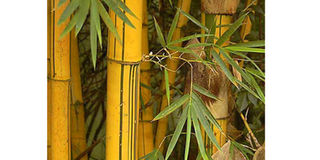Farmers turn to bamboo planting to earn more

Bamboo plant. PHOT/NET
What you need to know:
- Bamboo is grass with more than 10,000 known uses, predominantly, furniture making, firewood, clothing, bead working as well as being used in the construction and cottage industries.
Bamboos are the fastest-growing woody plants in the world. With the Kenyan government recently recognising it as the 16th cash crop in the country, Victor Mwanga, the chairman of the Bamboo
Association of Kenya, says the declaration is only bound to bolster the growing of bamboo by farmers, improving its value chain as a marketable commodity.
“At whatever level of the bamboo value chain—as a farmer, seedling propagator or in the value addition space, Kenyans are just now waking up to the economic potential of bamboo farming,” says Mwanga.
“We have worked with Kenya Forest Service and The Kenya Forestry Research Institute to establish 26 new bamboo nurseries within a year that offer standardised certified seedlings to farmers. This creates jobs for both bamboo association members and private players within the bamboo sector. 30,000 hectares of private farmland has also come under bamboo within the same timeframe,” he says
Bamboo is grass with more than 10,000 known uses, predominantly, furniture making, firewood, clothing, bead working as well as being used in the construction and cottage industries. Bamboo seedlings cost on average Shs5,000, 200 seedlings are suited to cater for an acre.
The plantlets should be spaced five by five metres apart, this leaves 25m in between the bamboos that can be used to introduce indigenous trees. Depending on the variety and ecological zone, bamboos take on average three to five years to mature.
When grown in with native tree varieties, bamboos spur their growth rate as they compete for sunlight. Once the bamboo is harvested a double canopy is formed with indigenous trees at the top and the growing bamboo at the bottom.
Bamboos are low maintenance requiring little looking after (no weeding, manuring or fertiliser application) once they are established. The bamboo has no tap root, rather fibrous roots which help to break soil hardpans allowing for air circulation.
A bamboo clamp has 30-50 culms (stems) with an average life span of five generations—up to 120 years, without needing replenishing.
Source: Farmbiz




